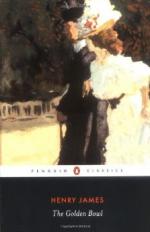had then communicated—so that they were
to remain together, for the time, in consequence,
quite in the form of a couple of sociable drinkers
who sit back from the table over which they have been
resting their elbows, over which they have emptied
to the last drop their respective charged cups.
The cups were still there on the table, but turned
upside down; and nothing was left for the companions
but to confirm by placid silences the fact that the
wine had been good. They had parted, positively,
as if, on either side, primed with it—primed
for whatever was to be; and everything between them,
as the month waned, added its touch of truth to this
similitude. Nothing, truly,
was at present
between them save that they were looking at each other
in infinite trust; it fairly wanted no more words,
and when they met, during the deep summer days, met
even without witnesses, when they kissed at morning
and evening, or on any of the other occasions of contact
that they had always so freely celebrated, a pair of
birds of the upper air could scarce have appeared
less to invite each other to sit down and worry afresh.
So it was that in the house itself, where more of
his waiting treasures than ever were provisionally
ranged, she sometimes only looked at him—from
end to end of the great gallery, the pride of the
house, for instance—as if, in one of the
halls of a museum, she had been an earnest young woman
with a Baedeker and he a vague gentleman to whom even
Baedekers were unknown. He had ever, of course,
had his way of walking about to review his possessions
and verify their condition; but this was a pastime
to which he now struck her as almost extravagantly
addicted, and when she passed near him and he turned
to give her a smile she caught—or so she
fancied—the greater depth of his small,
perpetual hum of contemplation. It was as if
he were singing to himself, sotto voce, as he went—and
it was also, on occasion, quite ineffably, as if Charlotte,
hovering, watching, listening, on her side too, kept
sufficiently within earshot to make it out as song,
and yet, for some reason connected with the very manner
of it, stood off and didn’t dare.
One of the attentions she had from immediately after
her marriage most freely paid him was that of her
interest in his rarities, her appreciation of his
taste, her native passion for beautiful objects and
her grateful desire not to miss anything he could
teach her about them. Maggie had in due course
seen her begin to “work” this fortunately
natural source of sympathy for all it was worth.
She took possession of the mound throughout its extent;
she abounded, to odd excess, one might have remarked,
in the assumption of its being for her, with her husband,
all the ground, the finest, clearest air and
most breathable medium common to them. It had
been given to Maggie to wonder if she didn’t,
in these intensities of approbation, too much shut
him up to his province; but this was a complaint he




